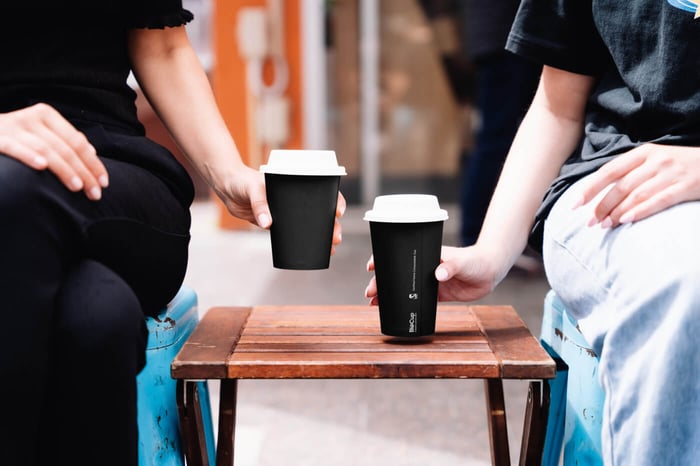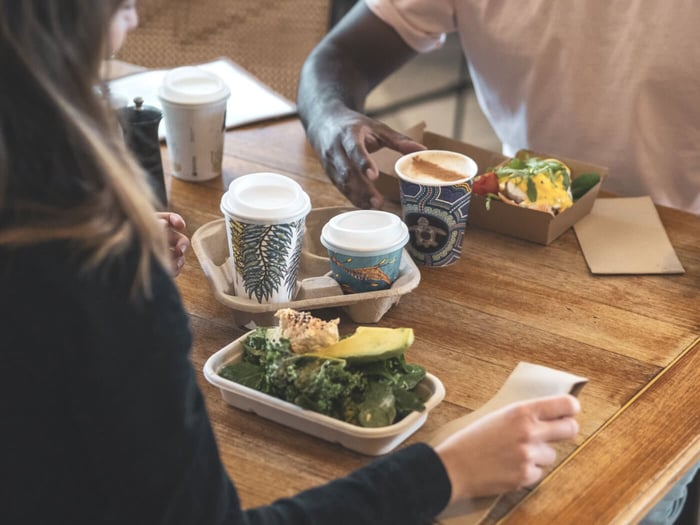Have you been eagerly anticipating the day when you could enjoy a takeaway coffee and effortlessly compost the cup in your own backyard? Well, that day has arrived. The market now offers aqueous coated coffee cups that are designed to be home compostable, thanks to the innovative technology of aqueous coating.
The Power of Aqueous Coated Cups
Aqueous coating, also known as water-based dispersion coating, has paved the way for the creation of home compostable coffee cups, as long as they meet the rigorous standards set by third-party certification. However, it is crucial to note that not all cups with an aqueous coating are created equal. It is essential to understand their composition, production process, and home compostability to ensure that you are making an informed choice and avoiding greenwashing.
Unlocking the Secrets of Aqueous Cups
We understand that the topic of aqueous coating can be complex, so let's dive into what aqueous cups are and how they contribute to the establishment of a circular economy.
Aqueous Cups: The Eco-Friendly Alternative
Aqueous cups are paper cups that are lined with a water-based dispersion coating. The term "aqueous" refers to the technique employed to create a protective barrier on the cup, preventing liquid from seeping through and enhancing the cup's durability. These cups, with their aqueous coating, are often considered a more eco-friendly alternative as they require less material compared to other coffee cups available in the market.
Aqueous Coating: The Science Behind It
So, what exactly is an aqueous coating made of, and how is it applied? Aqueous coating is created by immersing synthetic polymers into water, similar to the process of applying ink onto paper. This coating is then printed onto the cup's surface, and as the water evaporates, it forms a watertight layer, allowing the cup to hold your coffee without any leaks or sogginess.
The Green Advantage: Reduced Polymer Usage
One of the significant advantages of aqueous cups over other cup types is the reduced use of synthetic polymers. Since the aqueous coating is applied directly to the paper, it requires only a third of the amount of synthetic polymers compared to cups lined with bioplastic or plastic. Additionally, aqueous cups do not necessitate an extra waterproof layer because the coating becomes absorbed into the paper fibres, enhancing the cup's functionality.
Certified Compostability: The Key to Trust
When it comes to home compostability, it is essential to ensure that the aqueous cup you are using is certified as such. As a distributor of BioPak, our aqueous coated cups are certified to meet the rigorous home composting standards outlined in AS5810. However, it is not always the case for aqueous cups produced by other manufacturers. To verify the compostability of a coffee cup, you can check if it has received a home compostable certification from a reputable third-party organisation. The Australasian Bioplastics Association (ABA) database is a reliable resource for verifying the authenticity of such certifications.
Transparency Matters: Avoiding Greenwashing
Think of it this way: just as a person can claim to adhere to driving rules and regulations, their possession of a driver's license provides tangible proof of their qualification. Similarly, manufacturers of home compostable cups need to be transparent about their certification status, providing customers with confidence in the compostability of their coffee cups. At BioPak, they proudly provide their customers with verifiable home compostable certification numbers and display the home compostable logo on our cups.
Breaking Down the Myth of Polymers
Now, you might be wondering how aqueous cups can be compostable when they contain polymers. The technology behind aqueous cups ensures that they only contain a minimal amount of polymers, much less than other cups available in the market. For instance, BioPak's aqueous cups are certified as home compostable to AS5810 standards because they fall within the acceptable threshold of 1% contamination.
Aqueous Cups: A Comprehensive Solution
To successfully compost aqueous cups at home, specific conditions must be met. The BioPak aqueous cups are certified to break down within 180 days and completely disintegrate after 12 months, as demonstrated by rigorous testing. When combined with sugarcane lids, BioPak's aqueous cups offer a comprehensive home compostable solution for your coffee runs.
Versatility in Waste Management
It is worth noting that aqueous cups are not limited to home composting alone; they can also be industrially composted according to the AS4736 Australian standards, offering versatility in waste management options. However, BioPak recognises the existing limitations of the industrial composting infrastructure. In response, they launched Compost Connect, an initiative that connects foodservice businesses to compost services, enabling them to reduce landfill costs and actively contribute to a circular economy.
Beware of Greenwashing
Unfortunately, greenwashing, which involves making misleading claims about the environmental attributes of products, is a prevalent issue in the packaging industry. Some manufacturers may engage in deceptive practices when promoting aqueous cups or water-based lining paper cups. Here are a few examples of false claims that can be encountered:
- "Aqueous-lined cups are recyclable": While some manufacturers may assert that their aqueous cups are recyclable, it is crucial to note that no coffee cups in the market are currently recyclable. To verify the recyclability of your food or beverage packaging, you can consult the Packaging Recyclability Evaluation Portal.
- "Aqueous-lined cups are biodegradable": The claim that aqueous cups are biodegradable is not entirely accurate since everything eventually biodegrades, including plastic. However, the time it takes for biodegradation varies greatly. It is important to request transparency from manufacturers regarding the timeframe required for their products to biodegrade.
- "Aqueous-lined cups are plastic-free": Water-based lining cups do contain small amounts of polymers, making them not entirely plastic-free. Unfortunately, there are currently no completely plastic-free cups available in the market. However, efforts are underway to develop entirely plastic-free and ocean-degradable cup alternatives.
- "Aqueous-lined cups adhere to compostable standards": Any company can claim to adhere to compostable standards, but without proper certification, it is impossible to verify the genuineness of these claims. Third-party certification plays a critical role in ensuring the compostability of products. Customers should look for legitimate certifications and verify them through reliable sources such as the ABA database.
A Sustainable Future
As we envision the future of cups, it is evident that home compostable paper cups utilising aqueous coating technology currently offer the most viable solution. While the development of plastic-free and ocean-degradable alternatives is ongoing, BioPak remains committed to providing the market with the latest advancements in food and beverage packaging. They prioritise the careful selection of materials and invest in certifications to offer full transparency regarding the environmental impact of their products throughout their lifecycle.
Join the Sustainability Movement
Through collaborative efforts between governments, industry leaders, and organisations like BioPak, we anticipate the development of new and innovative solutions that will minimise the detrimental effects of disposable food packaging on the environment. Until then, you can find us enjoying our beverages from certified home compostable cups (AS5810), proudly contributing to a circular economy.





